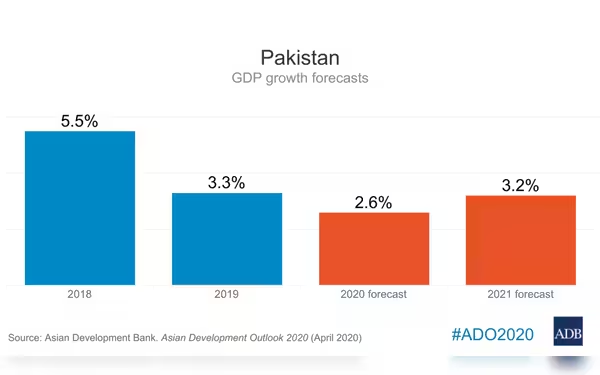Tuesday, July 2, 2024 04:11 PM
Asian Development Bank projects Pakistan's economic growth
- Political instability poses risk to Pakistan's economic stabilization
- ADB forecasts modest 2.8% economic growth for Pakistan in 2025
- Inflation expected to reach around 25% driven by higher energy prices
 Image Credits: Asian Development Bank
Image Credits: Asian Development BankThe Asian Development Bank's report on Pakistan's economic landscape highlights challenges and prospects, emphasizing the need for policy implementation, external financial support, and structural reforms for sustainable growth.
The Asian Development Bank (ADB) has recently released its April 2024 'Asian Development Outlook', shedding light on Pakistan's economic landscape. The report highlights the uncertainties surrounding the country's economic future, citing political instability as a significant risk to ongoing stabilization and reform efforts. The escalation of conflict in the Middle East poses a threat to Pakistan's economy due to potential supply chain disruptions. The ADB emphasizes the importance of external financial support from multilateral and bilateral partners to bolster Pakistan's weak external buffers.
Looking ahead, the ADB projects a modest economic growth rate of 2.8% for Pakistan in the fiscal year 2025, driven by increased confidence, reduced macroeconomic imbalances, and progress on structural reforms. However, the report anticipates subdued growth in the current fiscal year, with a gradual pickup expected in the following year contingent on the effective implementation of economic reforms.
In terms of inflation, the report forecasts a rate of around 25% for the current year, primarily driven by higher energy prices. While improvements in food supplies may alleviate some inflationary pressures, sustained increases in energy costs could keep inflation elevated. The ADB also notes that core inflation remains high, reflecting the recovery of domestic demand and adjustments in energy prices.
On the supply side, the report anticipates growth in agriculture following post-flood recovery efforts, which is expected to stimulate manufacturing activities. The relaxation of import restrictions coupled with economic recovery may lead to a widening current account deficit in 2024, projected at 1.5% of GDP.
Despite challenges posed by substantial external financing requirements and debt rollovers, Pakistan has seen a notable increase in tax collection, driven by reforms in personal income tax and other revenue-generating measures. The ADB expects further improvements in revenue mobilization through planned tax base expansion initiatives in the medium term.
The ADB's report provides a comprehensive overview of Pakistan's economic challenges and prospects. While uncertainties loom, concerted efforts towards policy implementation, external financial support, and structural reforms are crucial for steering the country towards sustainable economic growth and stability.













